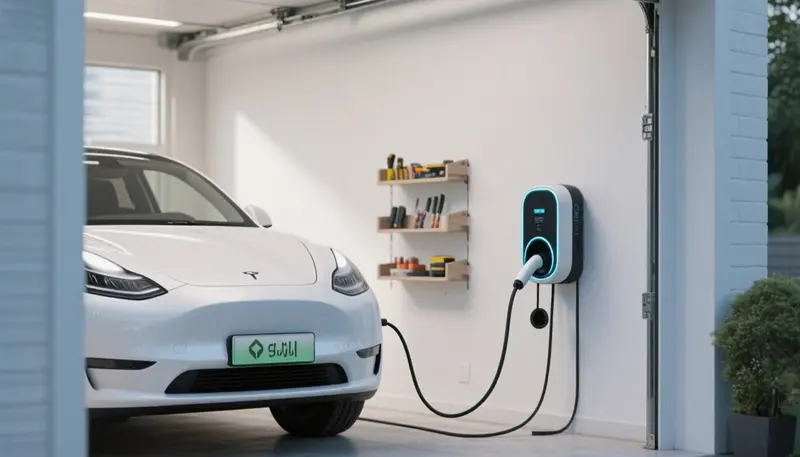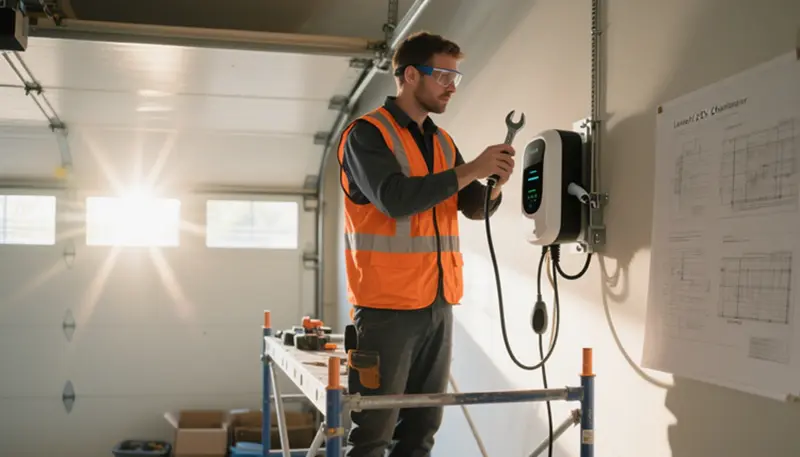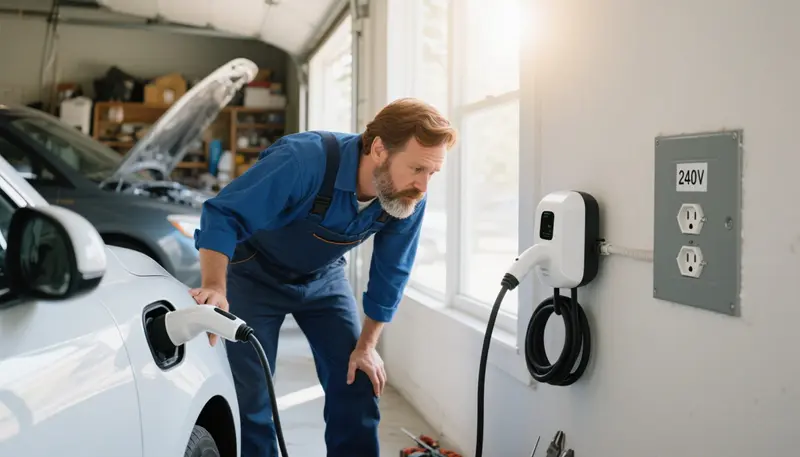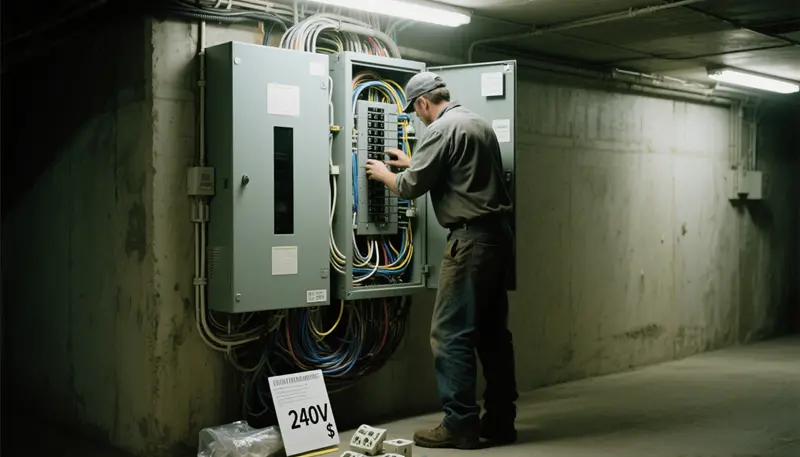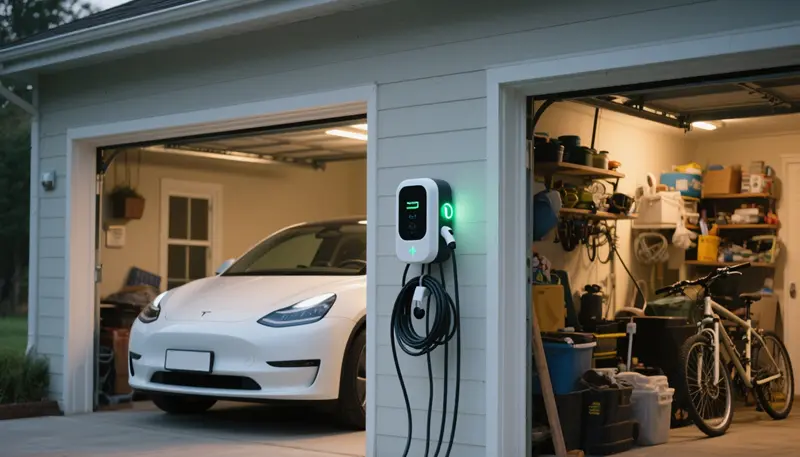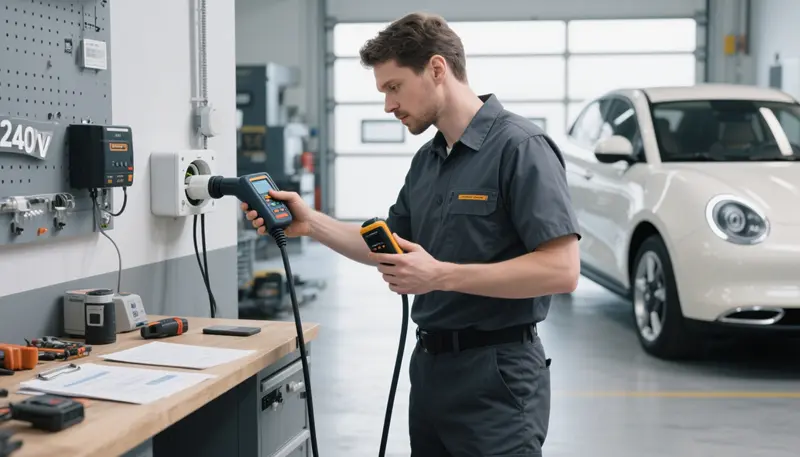Blog
Can You Install a DC Fast Charger at Home? A Comprehensive Guide
Introduction to DC Fast Charging at Home
As electric vehicles (EVs) become a staple of modern transportation, the need for faster, more efficient charging solutions is growing. While most EV owners rely on Level 1 or Level 2 chargers for home use, many are asking, “Can I install a fast EV charger at home?” Specifically, the idea of installing a DC fast charger at home is gaining attention due to its promise of ultra-fast charging speeds, rivaling those found at public charging stations. But is a DC home charger a practical solution for residential use? This comprehensive guide explores the feasibility, benefits, challenges, and costs of installing a DC fast charger at home, helping you decide if it’s the right choice for your EV charging needs.
This article dives deep into the world of DC fast chargers at home, addressing key questions about their installation, suitability, and alternatives. Whether you’re a high-mileage EV driver or simply curious about cutting-edge charging technology, we’ll provide authoritative insights and practical advice to guide your decision-making process. Let’s explore whether you can truly install a fast EV charger at home and what it takes to make it happen.
What Is a DC Fast Charger and Is It Suitable for Home Use?
Understanding DC Fast Charging
Unlike traditional Level 1 (120-volt) and Level 2 (240-volt) chargers, which deliver alternating current (AC) that the vehicle’s onboard charger converts to direct current (DC), a DC fast charger bypasses this conversion process. It delivers high-voltage DC power directly to the EV’s battery, enabling rapid charging. At public stations, DC fast chargers can provide 50-350 kW of power, adding 100-200 miles of range in just 20-30 minutes, depending on the vehicle and charger.
The allure of a DC fast charger at home lies in its speed. For example, a 50 kW DC charger can charge a typical EV from 20% to 80% in under 30 minutes, compared to 4-8 hours for a Level 2 charger. However, the high power demands and complex infrastructure make DC home chargers a challenging proposition for most households.
Benefits of DC Fast Charging at Home
- Speed: Charge your EV in a fraction of the time, ideal for drivers with high daily mileage or multiple EVs.
- Convenience: Enjoy the benefits of fast charging without relying on public stations.
- Future-Proofing: As EV battery capacities grow, a DC fast charger at home can keep up with advanced vehicles requiring faster charging.
- Energy Independence: Pairing a DC home charger with solar panels and battery storage can create a sustainable, high-speed charging ecosystem.
Limitations for Home Use
- High Power Requirements: DC fast chargers often require 50 kW or more, far exceeding the capacity of most residential electrical systems (typically 100-200 amps).
- Cost: Equipment and installation costs can range from $10,000 to $50,000 or more, making it a significant investment.
- Space and Infrastructure: DC chargers are larger than Level 2 chargers and may require cooling systems or dedicated electrical upgrades.
- Battery Health: Frequent DC fast charging may accelerate battery degradation in some EVs, though modern battery management systems mitigate this.
Given these factors, can you install a fast EV charger at home? The answer is yes, but it’s not practical for most households due to cost, complexity, and infrastructure limitations. Let’s explore the feasibility in detail.
Is Installing a DC Fast Charger at Home Feasible?
Assessing Your Home’s Electrical Capacity
To install a fast EV charger at home, your electrical system must support the high power demands of a DC fast charger. Here’s what you need to evaluate:
- Electrical Service: Most homes have 100-200 amp service at 240 volts, sufficient for Level 2 chargers (7-11 kW). A DC fast charger, however, may require 50-150 kW, necessitating a dedicated high-voltage feed or even a commercial-grade electrical service.
- Transformer Upgrades: If your home’s electrical transformer can’t handle the load, you may need a utility upgrade, which can cost tens of thousands of dollars.
- Wiring and Conduit: DC chargers require heavy-duty wiring and possibly underground conduits, increasing installation complexity.
A licensed electrician or electrical engineer must assess your home’s capacity. In most cases, only high-end properties or homes with existing commercial-grade electrical systems (e.g., those with solar-plus-storage setups) are suitable for a DC fast charger at home.
Scenarios Where DC Fast Charging Makes Sense
While rare, some scenarios justify installing a DC home charger:
- High-Mileage Drivers: If you drive 200+ miles daily or operate a fleet of EVs (e.g., for a business), the time savings of DC fast charging may outweigh the costs.
- Multi-EV Households: Homes with multiple EVs may benefit from faster charging to ensure all vehicles are ready when needed.
- Off-Grid or Solar-Powered Homes: Pairing a DC fast charger at home with a robust solar array and battery storage (e.g., Tesla Powerwall) can support high-power charging without straining the grid.
- Luxury Properties: High-end homes with ample electrical capacity and space may accommodate DC chargers as a premium feature.
Alternatives to DC Fast Charging
For most homeowners, a high-power Level 2 charger (e.g., 48-60 amps, delivering 11-19 kW) offers a more practical solution. These chargers can add 30-50 miles of range per hour, meeting the needs of most EV drivers at a fraction of the cost and complexity of a DC home charger.
DC Fast Charger vs. Level 2 Charger: A Detailed Comparison
To decide whether to install a fast EV charger at home, it’s helpful to compare DC fast chargers with Level 2 chargers, the most common home charging solution.
Feature | DC Fast Charger | |
|---|---|---|
Charging Speed | 50-150 kW (100-200 miles in 20-30 min) | 7-19 kW (20-50 miles per hour) |
Cost of Equipment | $10,000-$50,000 | $300-$1,200 |
Installation Cost | $5,000-$20,000+ (plus potential upgrades) | $500-$2,500 |
Electrical Requirements | High-voltage feed, possible transformer | 240V, 40-60 amp circuit |
Typical Use Case | Commercial stations, high-mileage homes | Most residential EV charging |
Impact on Battery | Potential degradation with frequent use | Minimal impact with proper use |
Space Requirements | Large, may need cooling systems | Compact, wall-mounted |
Key Takeaways
- Speed: A DC fast charger at home is significantly faster, but Level 2 chargers are sufficient for overnight charging.
- Cost: Level 2 chargers are far more affordable, making them the default choice for installing a fast EV charger at home.(e.g.,👉 FlagTools Home EV Charger)
- Practicality: Unless you have unique needs (e.g., multiple EVs or high mileage), a Level 2 charger is more practical and cost-effective.
Installation Requirements and Challenges for a DC Fast Charger at Home
Technical Requirements
Installing a DC home charger is a complex process that goes beyond standard electrical work. Here’s what’s involved:
High-Power Electrical Supply:
- A 50 kW DC charger requires approximately 200-250 amps at 240 volts, far exceeding most residential panels.
- You may need a dedicated high-voltage line or a commercial-grade transformer, which requires coordination with your utility provider.
Cooling Systems:
- DC fast chargers generate significant heat, often requiring liquid cooling or forced-air systems to maintain performance.
- This adds to the equipment cost and space requirements.
Permits and Approvals:
- Local building codes and utility regulations may restrict DC fast charger at home installations due to their high power demands.
- You’ll need permits and possibly an engineering review to ensure compliance.
Space Considerations:
- DC chargers are larger than Level 2 units, requiring a dedicated space in your garage, driveway, or yard.
- Outdoor installations need weatherproof enclosures (e.g., NEMA 4) and protection from vehicle impacts.
Professional Installation:
- Only licensed electricians or electrical engineers with experience in high-voltage systems should install a DC home charger.
- Specialized contractors familiar with commercial charging stations may be required.
Challenges
- Cost: The combined cost of equipment, installation, and electrical upgrades can easily exceed $20,000-$50,000, making it prohibitive for most homeowners.
- Utility Coordination: Upgrading your home’s electrical service or transformer requires approval from your utility, which can be time-consuming and expensive.
- Battery Longevity: Frequent DC fast charging may reduce EV battery lifespan, though modern EVs (e.g., Tesla, Rivian) have advanced thermal management to mitigate this.
- Limited Availability: Few manufacturers offer residential DC fast chargers, and those available (e.g., Delta Electronics, ABB) are designed for commercial use, with limited home compatibility.
Alternatives to DC Fast Charging
If a DC fast charger at home isn’t feasible, consider these alternatives:
- High-Power Level 2 Charger: A 48-60 amp Level 2 charger can deliver near-DC speeds for most EVs.
- Portable Level 2 Chargers: Some EVs come with portable chargers that can use high-amperage outlets, offering flexibility without permanent installation.
- Public DC Fast Charging: For occasional fast charging, rely on nearby public stations while using a Level 2 charger at home for daily needs.
Costs and Return on Investment for a DC Fast Charger at Home
Breakdown of Costs
Installing a DC fast charger at home is a significant investment. Here’s a detailed cost breakdown:
Equipment Costs:
- DC fast chargers range from $10,000 to $50,000, depending on power output (50-150 kW) and brand (e.g., ABB, Delta, or Electrify America).
- Additional components like cooling systems or mounting hardware may add $1,000-$5,000.
Installation Costs:
- Basic electrical work (wiring, conduit, mounting): $5,000-$10,000.
- Electrical panel or transformer upgrades: $5,000-$20,000 or more.
- Permitting and inspection fees: $200-$1,000.
Utility Upgrades:
- Upgrading to a high-voltage feed or commercial transformer can cost $10,000-$30,000, depending on your utility and location.
Ongoing Costs:
- Higher electricity rates for high-power charging, especially during peak hours.
- Maintenance costs for cooling systems or software updates (e.g., $500-$1,000 annually).
Potential Savings and Incentives
- Government Incentives: Some regions offer rebates or tax credits for EV charger installations, though DC fast chargers may not qualify for residential programs. For example, the U.S. federal tax credit (up to 30% of costs, capped at $1,000 for residential installations as of 2025) typically applies to Level 2 chargers but may not cover DC home chargers.
- Utility Programs: Some utilities offer time-of-use (TOU) rates or rebates for off-peak charging, reducing operational costs.
- Long-Term Savings: For high-mileage drivers or multi-EV households, the time saved with a DC fast charger at home may outweigh the upfront costs, especially if you avoid public charging fees.
Return on Investment (ROI)
The ROI for a DC fast charger at home depends on your driving habits and charging needs:
- High-Mileage Drivers: If you drive 200+ miles daily or operate multiple EVs, the convenience and time savings may justify the cost over 5-10 years.
- Average Drivers: For most EV owners, a Level 2 charger provides sufficient charging speed at a fraction of the cost, offering better ROI.
- Property Value: A DC home charger may increase your home’s appeal to future EV-owning buyers, though the impact is less significant than Level 2 chargers.
Given the high costs, a DC fast charger at home is typically only cost-effective for niche use cases, such as businesses, car enthusiasts, or homes with advanced energy systems.
Frequently Asked Questions (FAQ)
Q: Can I install a fast EV charger at home?
A: Yes, it’s possible to install a fast EV charger at home, but it’s not practical for most households. DC fast chargers require significant electrical upgrades, costing $10,000-$50,000 or more. A high-power Level 2 charger (e.g., 48 amps) is usually a better option, offering fast charging at a lower cost.
Q: How much power does a DC fast charger at home require?
A: A DC fast charger at home typically requires 50-150 kW, equivalent to 200-600 amps at 240 volts. Most homes have 100-200 amp service, so major upgrades (e.g., a new transformer) are often needed.
Q: Will a DC home charger affect my EV’s battery life?
A: Frequent DC fast charging may accelerate battery degradation in some EVs, but modern vehicles (e.g., Tesla, Rivian, Hyundai Ioniq) have advanced battery management systems to minimize this. For daily use, Level 2 charging is gentler on batteries.
Q: Are there residential DC fast chargers available?
A: Few manufacturers offer DC fast chargers designed for residential use. Most models (e.g., ABB Terra, Delta DC Wallbox) are intended for commercial applications but can be adapted for homes with sufficient electrical capacity.
Q: How long does it take to install a DC fast charger at home?
A: Installation can take 1-3 days for the charger itself, but electrical upgrades (e.g., transformer or high-voltage feed) may take weeks or months due to utility coordination and permitting.
Q: Are there cheaper alternatives to a DC fast charger at home?
A: Yes, a high-power Level 2 charger (11-19 kW) can provide fast charging (30-50 miles per hour) at a fraction of the cost. These chargers are easier to install and more practical for most homes.
Conclusion: Is a DC Fast Charger at Home Right for You?
Installing a DC fast charger at home is an ambitious goal that offers unparalleled charging speed and convenience for EV owners. However, the high costs, complex infrastructure, and significant electrical upgrades make it impractical for most households. For the average EV driver, a Level 2 charger (especially a high-power model) provides a cost-effective, reliable solution that meets daily charging needs without the challenges of a DC home charger.
If you’re considering a fast EV charger at home, consult a licensed electrician or electrical engineer to assess your home’s electrical capacity and explore feasibility. For high-mileage drivers, multi-EV households, or those with advanced energy systems, a DC fast charger at home may be worth exploring, but for most, a Level 2 charger is the smarter choice.
Call to Action: Ready to explore your home charging options? Contact a certified electrician to evaluate your electrical system and get quotes for installing a fast EV charger at home. If a DC fast charger isn’t feasible, ask about high-power Level 2 chargers to meet your needs. Start your journey to faster, more convenient EV charging today!


